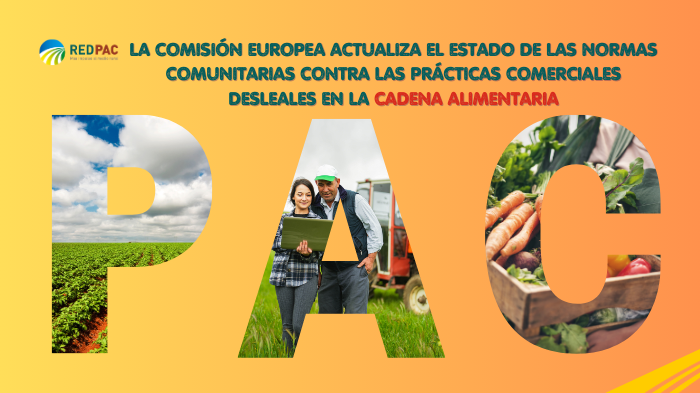
07 de March de 2025
Calidad y cadena alimentaria
Resiliencia y competitividad
The European Commission proposes amendments to strengthen farmers' position in the agri-food supply chain.
- The European Commission proposes amendments to strengthen farmers' position in the agri-food supply chain.
- The Plan includes a cooperative program among Member States for cross-border enforcement of regulations against unfair commercial practices.
On December 10, 2024, the European Commission (EC) presented a series of specific proposals within the current legal framework of the "Common Market Organization Regulation" (CMO) aimed at strengthening the position of farmers in the agri-food supply chain:
- Fairer contracts: mandatory written contracts between farmers and buyers, with improved terms to reflect market developments.
- Establish mediation mechanisms between actors in the agri-food chain.
- Strengthening producer organizations : greater bargaining power, financial support, and simplification of legal recognition processes.
- Crisis support: promoting European Union (EU) aid to producer organizations that adopt crisis management measures.
- Regulate key terms : concepts such as “fair,” “equitable,” or “short supply chains” in the marketing of agricultural products.
- Sustainability agreements: enabling social impact initiatives such as supporting generational renewal, small farmers, and improving working conditions.
All legislative amendments proposed by the EC must be debated in the European Parliament and the European Council for possible subsequent adoption.
Cross-border enforcement against unfair practices
Considering that around 20% of the agricultural products consumed by an EU Member State originate from another Member State, it is necessary to facilitate cooperative work between national law enforcement authorities in each country. Therefore, in addition to all the proposals already mentioned, the EC is adding new rules that strengthen cross-border enforcement against unfair trading practices in the agricultural supply chain, the key points of which are:
- Introduction of a transnational legislative framework for the implementation of these standards.
- Creation of a mutual assistance mechanism that allows national authorities to exchange information and request enforcement measures from other authorities on their behalf.
- Conduct cross-border investigations where there are reasonable suspicions of unfair trading practices between Member States through coordinated action.
- Improve the protection of EU farmers and small and medium-sized suppliers.
The EC has also adopted an amendment to the "de minimis" regulation for the agricultural sector, making it easier for Member States to provide state aid to small businesses and farmers without having to notify the EC, creating a simpler, faster, and more direct system.
Background
The Commission has implemented various measures in recent years to strengthen farmers' position in the agri-food supply chain and combat unfair trading practices. The most significant milestones have been:
- Year 2019
The Unfair Trading Practices Directive (UTP) has been adopted , prohibiting 16 practices that can have harmful effects on the most vulnerable actors in the food supply chain, particularly farmers and smaller suppliers. Improving farmers' position in the food supply chain, supporting their incomes, and ensuring fair remuneration are three of the most important objectives of the Common Agricultural Policy (CAP) .
- Years 2021-2022
EU Member States had until May 2021 to transpose the aforementioned directive into their legislation. This task was completed in December 2022.
- Year 2023
1,500 investigations into unfair trading practices were carried out across Europe, 17% of which resulted in sanctions.
- Year 2024
In February , the EC drafted a document proposing measures to simplify the CAP due to the administrative burden placed on farmers.
Two surveys were also conducted : one aimed at the agricultural sector to understand their concerns about bureaucratic management; and another aimed at both farmers and suppliers to share their experiences with unfair trading practices.
In April , the EC published a report on the implementation of the PCD in the food supply chain , which included three main points: unfair practices identified at the EU level, areas for improvement in the regulation based on the sector survey, and new rules to be introduced by the Commission.
In addition, the EU Agri-Food Chain Observatory (AFCO) was created to improve transparency in the sector.
Throughout 2024, the impact of this regulation on the sector has continued to be reviewed through questionnaires sent to farmers and suppliers. All of these actions reflect the EU's commitment to a fairer, more equitable, and sustainable agri-food system for producers.









